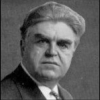John L. Lewis

John L. Lewis
John Llewellyn Lewiswas an American leader of organized labor who served as president of the United Mine Workers of Americafrom 1920 to 1960. A major player in the history of coal mining, he was the driving force behind the founding of the Congress of Industrial Organizations, which established the United Steel Workers of America and helped organize millions of other industrial workers in the 1930s. After resigning as head of the CIO in 1941, he took the Mine Workers out...
NationalityAmerican
ProfessionLeader
Date of Birth12 February 1880
CountryUnited States of America
Ordinary problems affecting wages, hours, and working conditions, in most instances, will quickly respond to negotiation in the council room.
But the Committee for Industrial Organizations is here. It is now henceforth a definite instrumentality, destined greatly to influence the lives of our people and the internal and external course of the republic.
The steel workers have now buried their dead, while the widows weep and watch their orphaned children become objects of public charity. The murder of these unarmed men has never been publicly rebuked by any authoritative officer of the state or federal government.
Five of the corporations in the steel industry elected to resist collective bargaining and undertook to destroy the steel workers' union.
This is true only because the purposes and objectives of the Committee for Industrial Organization find economic, social, political and moral justification in the hearts of the millions who are its members and the millions more who support it.
The organized workers of America, free in their industrial life, conscious partners in production, secure in their homes and enjoying a decent standard of living, will prove the finest bulwark against the intrusion of alien doctrines of government.
Who gets the bird, the hunter or the dog.
The real breeders of discontent and alien doctrines of government and philosophies subversive of good citizenship are such as these who take the law into their own hands.
Labor was marching toward the goal of industrial democracy and contributing constructively toward a more rational arrangement of our domestic economy.
In the steel industry the corporations generally have accepted collective bargaining and negotiated wage agreements with the Committee for Industrial Organization.
Unionization, as opposed to communism, presupposes the relation of employment; it is based upon the wage system and it recognizes fully and unreservedly the institution of private property and the right to investment profit.
The men in the steel industry who sacrificed their all were nor merely aiding their fellows at home but were adding strength to the cause of their comrades in all industry.
The organization and constant onward sweep of this movement exemplifies the resentment of the many toward the selfishness, greed and the neglect of the few.
Courage is not how a man stands or falls, but how he gets back up again